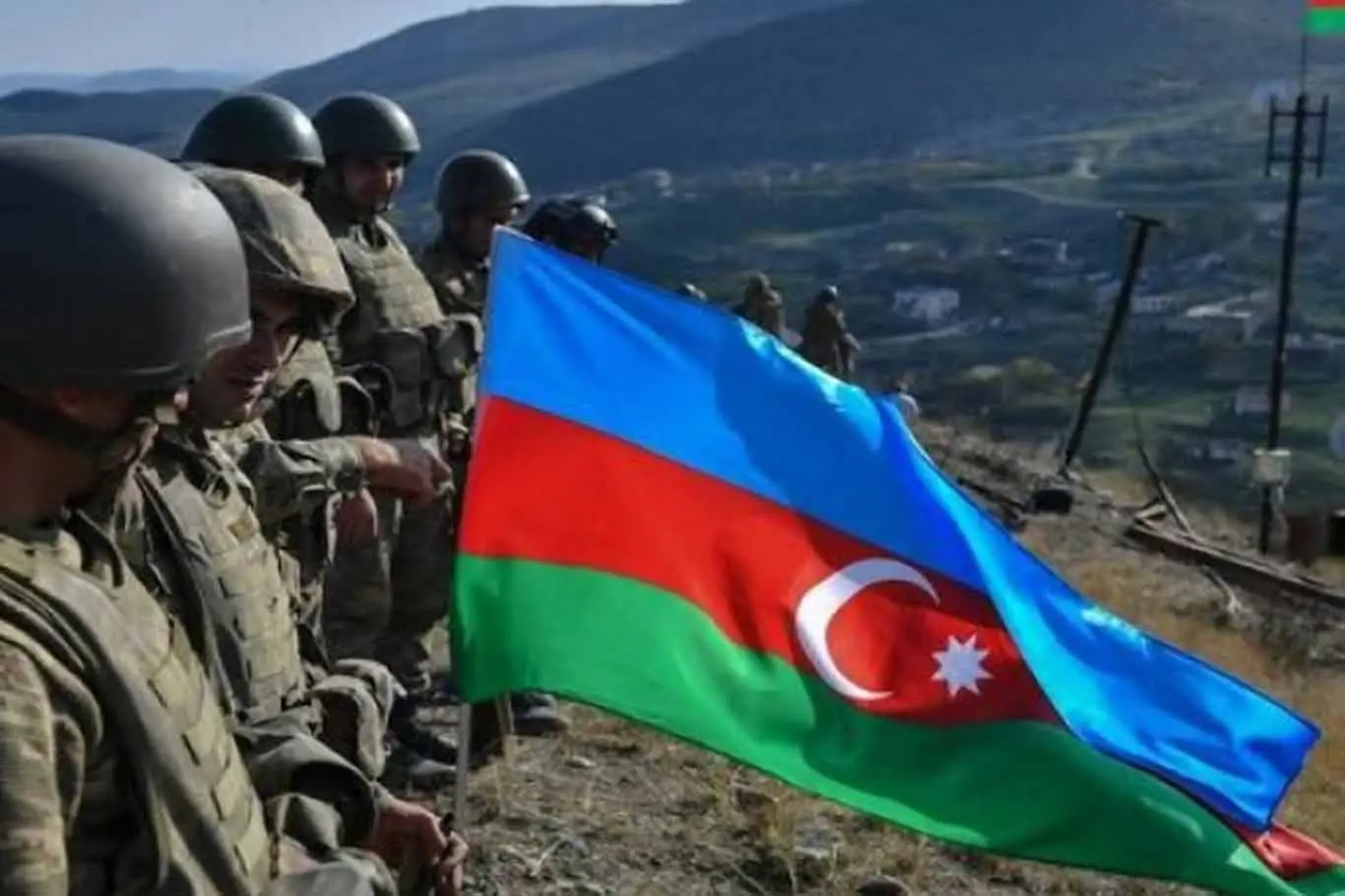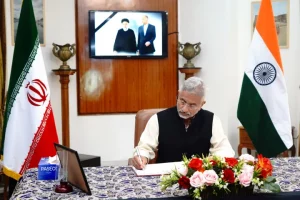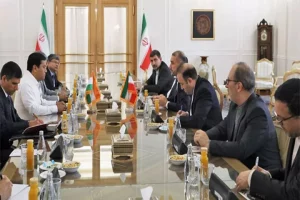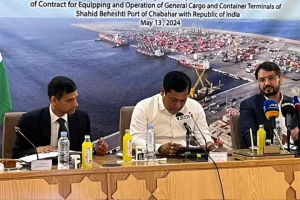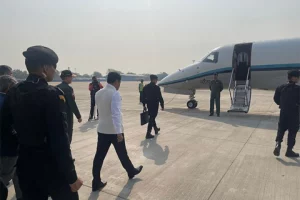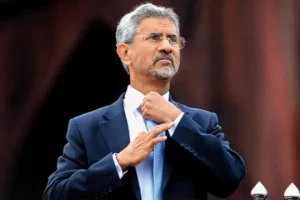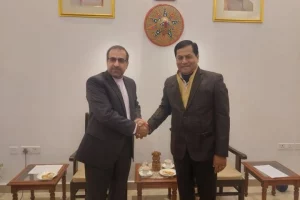As Turkish president Reccep Tayip Erdogan was touring the areas of Nagorno Karabakh, the disputed territory between Armenia and Azerbaijan, which the latter wrested from the former’s control in a war two years ago, amply aided by Turkey, Iranian Foreign Minister Hossein Amir-Abdollahian was paying his first official visit to Armenia. Erdogan was visiting the Karabakh territories, along with Azerbaijan’s President Ilham Aliyev, to mark the second anniversary of Azerbaijan’s victory over Armenia in the Karabakh war of 2020 and also to attend the inauguration ceremony of the Zangilan airport, the second international airport that Azerbaijan has opened in those territories. Though such visits are planned days ahead, the timing may not be coincidental.
On the eve of the visit, Iran’s Islamic Revolution Guards Corps (IRGC) launched large-scale military exercises named “Mighty Iran” along the country’s border with Azerbaijan. The territory where the exercises took place are reported to border the Nakhchivan exclave of Azerbaijan. Apart from other things these exercises stand out because for the first time, pontoon temporary bridges were deployed to train forces and military vehicles to navigate through water obstacles. This is significant given that at many points the Aras River forms the natural border between Iran and Azerbaijan.
Just a year ago this time Azerbaijan and Iran had been embroiled in a war of words because of the military drills that Tehran decided to conduct along its border with Azerbaijan, involving armoured and artillery units as well as drones and helicopters.
They were accompanied by a statement released by Iran’s Islamic Revolutionary Guard Corps (IRGC) which said “We warn all those who are trying to destabilize the northern borders of Iran, and assert our preparedness to impede the evil designs of our enemies.” The allusion was to increasing Azerbaijani rhetoric about “Greater Azerbaijan”, or subtle irredentist claims on Iran’s Azeri province.
The Azeris in Iran, widely known as South Azerbaijan, are protesting against the Mullahs: “We’re neither pro-Mullah nor pro-Shah. We’re the nationalists”. The Azeris in South Azerbaijan are increasingly calling for an independent state of their own. pic.twitter.com/PA5qWZezGo
— Vugar Bakhshalizade (@therealvugar) November 3, 2022
Since the 2020 Karabakh war, which Azerbaijan won wresting back the Armenian majority enclave from its neighbor and rival Armenia, which had held on to it for two decades, Azerbaijan has been upping the ante on reclaiming other lands which it believed historically belonged to it. And, there is no small encouragement from Turkey, whose arms, drones, and military advisors had won the 2020 war for Azerbaijan. The war also resulted in some bordering areas of friendly Armenia now becoming part of Iran’s border with Azerbaijan. A year later, Baku conducted military drills on its territory together with its new found pals Turkey and Pakistan.
Tehran is worried that the newly stirred up nationalism witnessed in Azerbaijan during the war, especially following its victory, may stir up similar sentiments and provoke secessionist tendencies among its Azeri population, many of whom had batted for Azerbaijan during the 2020 war. With riots and protests raging on in Iran over the hijab case for weeks now, Iran is all the more on tenterhooks.
This is why Iran is also against the Zengazur Corridor that Azerbaijan has been demanding from Armenia. It is a land corridor that Azerbaijan envisages would connect it to the Azerbaijani exclave of Nakhichevan in western Armenia and onward to Turkey without Armenian border control over it. It cuts through Armenia’s southernmost province of Syuni which borders Iran’s Azeri province in the north. Armenians explain they are not against any land corridor as connectivity is critical for countries like it. However, since it runs through Armenian territory, it should be subject to Armenian control.
For both Azerbaijan and Turkey, this land corridor without Armenian control would open up routes to Central Asia, fan pan-Turkism, and would give Azerbaijan control over the borders with Iran which it can then cut off at will, cutting Iran completely off from the northern route, rendering the International North South Transport Corridor (INSTC) useless, or put it at the will of Azerbaijan-Turkey combine.
This is why too around the same time Iran’s Trade Promotion Organization, Alireza Peymanpak, announced: “Two alternative Iran-Eurasia transit routes will replace Azerbaijan’s route. First opens in a month via Armenia after [the] end of repair work, and the second via sea by purchasing and renting vessels.”
It was no coincidence that months preceding Peymanpak’s announcement, the Indian Ambassador to Iran, Gaddam Dharmendra had announced that India was planning to connect the Chabahar port on Iran’s eastern cost (a seaport heavily invested in by India) and the Indian Ocean with Eurasia and Helsinki through the INSTC which would run through the territory of Armenia.
On the virtual meeting to mark Chabahar Day last year, India also invited not just its traditional partners, but also Armenia. While India pitched for connecting the Chabahar port to Iran’s Bandar Abbas port which connects to the INSTC, both India and Iran have decided that the INSTC, originally envisaged to run through Azerbaijan’s territory will now run instead through Armenian territory.
Defence Minister of #Armenia Suren Papikyan participated in the conference of #Defence ministers on the “Indian Ocean Region and Partners” theme.
During the conference, current issues of international security and the possibilities of solution were discussed. pic.twitter.com/Sy96FhkgPd— MoD of Armenia 🇦🇲 (@ArmeniaMODTeam) October 19, 2022
It is, therefore, interesting to note that while Abdullahian was on his first visit to Yeravan, the Armenian Defence Minister was in Gujarat expanding defence and military cooperation with India. Both India and Iran are wary of Baku’s new found belligerence. Iran is wary of Israeli presence on Azerbaijan’s territory. For India, Israel is a close friend and partner. But Azerbaijan’s rhetoric on Kashmir complements Turkey’s belligerence on Kashmir.
It was not unpredictable but symptomatic that on 27 October when Pakistan’s embassy in Baku hosted an event to (falsely) commemorate “Kashmir Black Day”, in attendance were members of Azerbaijan’s parliament as well as officials from its Ministry of Foreign Affairs. Baku’s new found belligerence is paving the way for an India-Iran-Armenia trilateral cooperation, one which may make Baku’s strategic location irrelevant.
Also Read: India’s defence ties with Armenia are a step in the right direction






